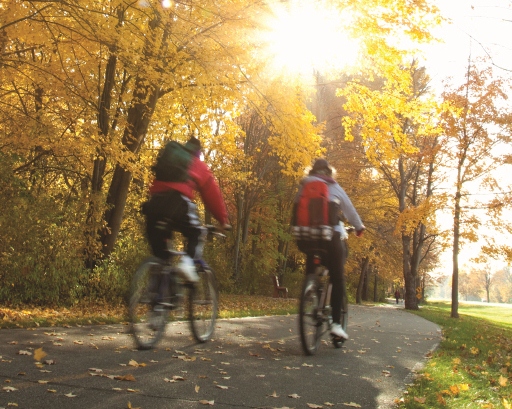
By Matt Doll, Minnesota Environmental Partnership
Yesterday, September 21, the City of Minneapolis partnered with Move Minneapolis to celebrate World Car Free Day, marked by cities around the world as a day to raise awareness of the many sustainable options available to commuters. The event included award contests, free transit pass giveaways, sharing of stories, and outreach to inform commuters of alternatives – cycling, carpooling, public transit, and walking – to one commuter using one car.
The goal of World Car Free Day isn’t merely to keep a few cars off the road for a day, but to help commuters realize that in the long term, a clean commute is much more enjoyable than they might have expected.
Switching from the solo drive carries many benefits
Better for our air – To start with, any reduction in car usage is good for Minnesota’s air and efforts to mitigate climate change. Because of the decline of coal power in Minnesota, our electricity generation no longer makes up the largest share of greenhouse gas pollution – transportation is now our leading sector for those emissions. And vehicles are a powerful contributor of other air pollutants, like particulates and ozone, that cause asthma and other respiratory diseases. The fewer cars traveling on Minnesota’s roads on any given day, the cleaner our air will be.
Better for our planet – Fortunately, there’s enormous potential for Minnesotans to make relatively painless changes in their driving habits. According to the National Household Travel Survey, around 21% – roughly one in five – of all private vehicle trips in the United States are one mile or less in distance. Granted, many of those trips are necessary, but most people can walk a mile at a leisurely pace in roughly 20 minutes. Furthermore, the survey states that trips under 5 miles account for roughly 60% of the nation’s vehicle trips. If even a fraction of these individual car trips were replaced by walking, biking, carpooling, or public transit, we could reduce emissions by millions of metric tons of carbon dioxide.
Better for your neighbor – These environmental benefits are compounded by the benefits to other commuters, especially those who may still need to drive. Removing cars from the road reduces traffic congestion, cutting travel times for drivers and allowing vehicle engines to operate more efficiently, cutting emissions further. Rather than increasing congestion, bicycle lanes, safe sidewalks, and transit routes reduce it if they’re made accessible and safe for the public.
Better for you! – Finally, reducing car trips through clean transportation carries significant personal benefits. A multi-national study carried out in several European cities found that commuting by bike was correlated with improved mental, physical, and social well-being. And the Department of Health and Human Services recommends that adults get at least 150 minutes of moderate exercise each week – an amount easily covered by a few manageable walking or bicycle trips. And compared with the maintenance and fuel costs of a personal vehicle, most other forms of transportation average out to be far cheaper for short trips.
Accessibility is an issue – but it’s improving in many places
Granted, not everyone may be able to walk, bike, or take a train or bus to their destinations, and for many of those who can, lack of accessibility can be a major obstacle. But that’s an argument for supporting better options for clean transportation, not staying stuck in the rut of solo car trips. Many investments already being made in Minnesota are making clean transportation more accessible, and there are more we should continue to support.
Contrary to stereotypes, bicycling isn’t relegated to the Twin Cities metro – it’s growing around the entire state. The Bicycle Alliance of Minnesota – an MEP member organization – recognizes twenty-two Bicycle Friendly Communities in Minnesota, from Grand Forks to Grand Marais and Willmar to Winona. Three colleges in Greater Minnesota – Minnesota State University in Mankato, Concordia College in Moorhead, and Gustavus Adolphus in St. Peter – were recognized as Bicycle Friendly Universities by the League of American Bicyclists in 2018.
Public transit is also growing around the state, with services expanding in in several Greater Minnesota communities. And in addition to bus and rail transport, the Twin Cities’ Metro Transit offers an online carpool matching service.
However, Minnesota’s clean transportation landscape needs improvements. Improving safe biking and walking infrastructure is critical to giving Minnesotans peace of mind when getting around without a car. And further investments in public transit are important to both affordability and expanded service (a CityLab report provides concrete evidence that improving service makes more people want to ride transit.)
Are you a candidate for a car-free commute? Recent columns in the Star Tribune from Jennifer Brooks and Sarah Buntzman Strong share their stories of trying – and actually liking – the act of getting to work without their vehicle.
Not everyone can or will start going car-free on their daily journeys. But to those who are able, we say: why not give it a try?